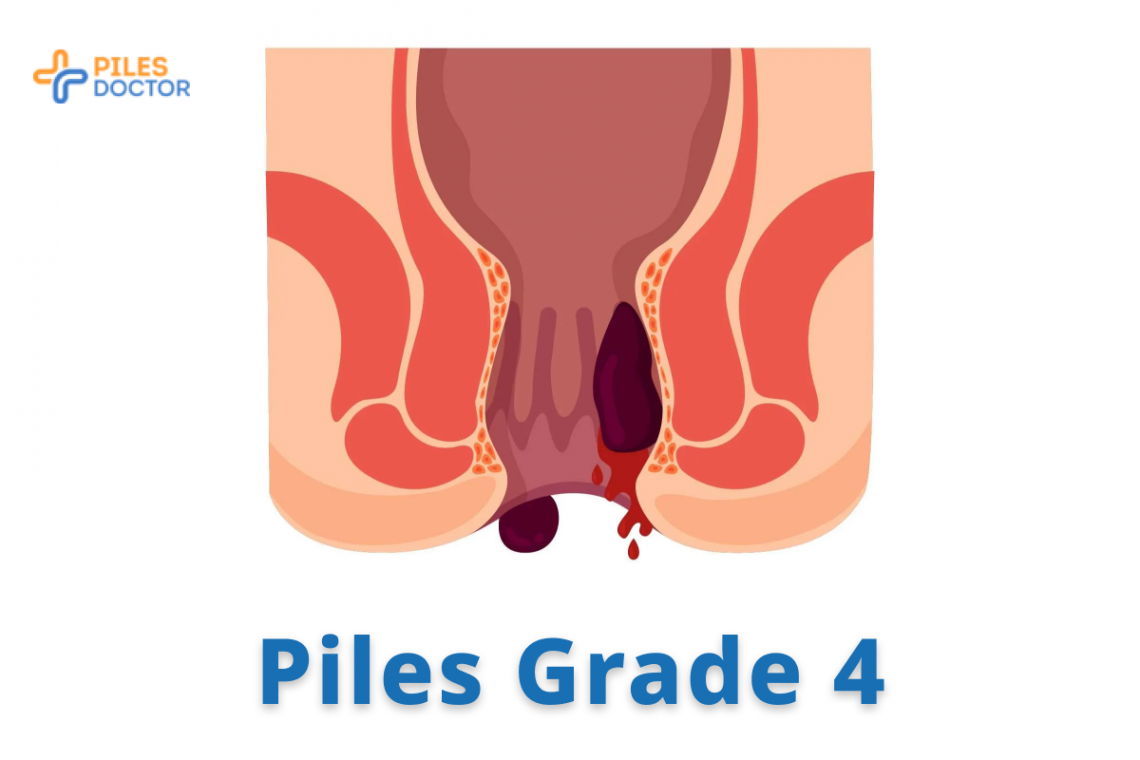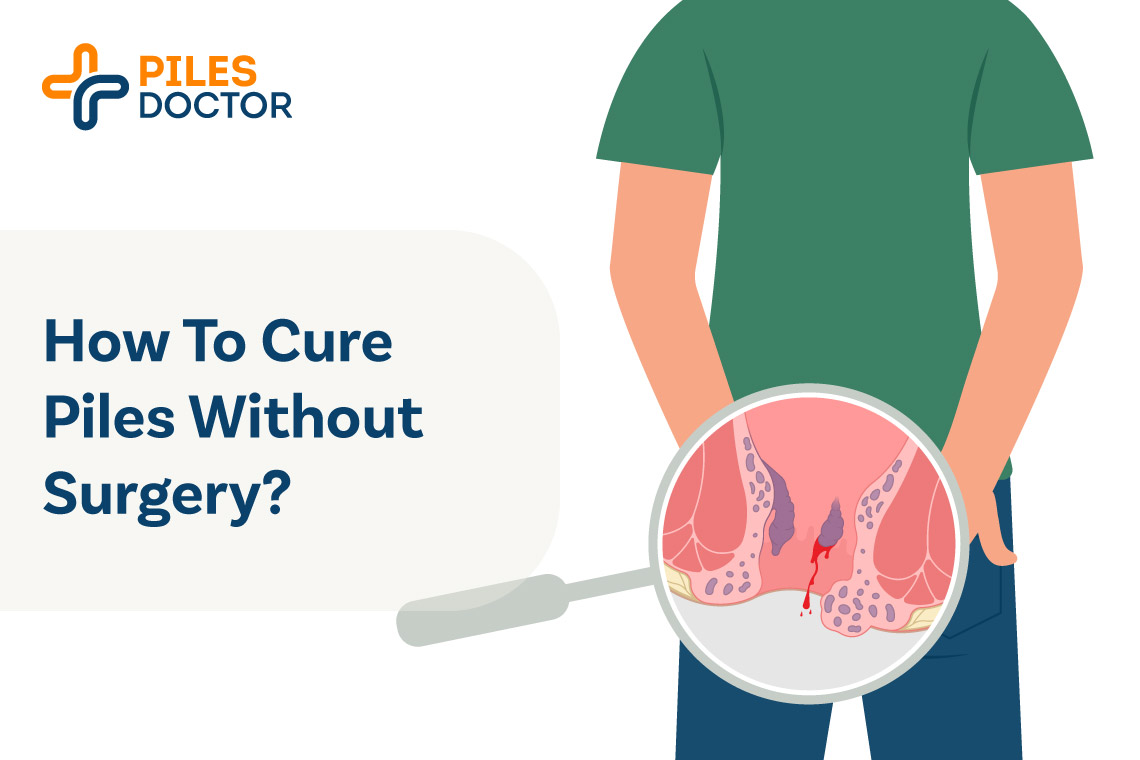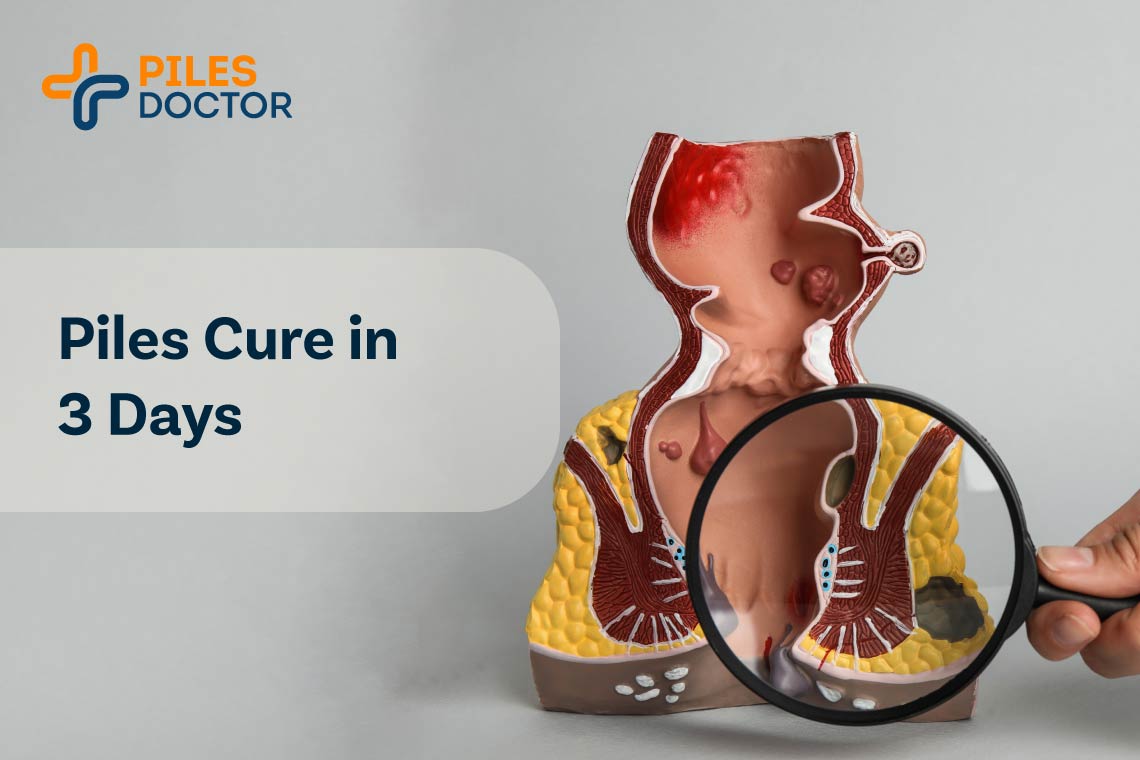Grade 4 piles or hemorrhoids is the most advanced stage of the piles. In this stage, swollen lumps are permanently prolapsed and cannot be manually pushed back inside.
They may cause persistent discomfort, pain, and bleeding. Patients with Grade 4 hemorrhoids often require surgical intervention to alleviate grade 4 piles symptoms and address the condition effectively.
It is essential for individuals experiencing Grade 4 piles to consult an experienced proctologist to determine the most suitable treatment approach for their specific situation.
Can Grade 4 Piles be Treated Without Surgery?
Since Grade 4 hemorrhoids is the most advanced stage of hemorrhoids, treatment without surgery is often challenging. In some cases, non-surgical approaches like dietary modifications, increased fiber intake, proper hydration, and topical treatments can help manage grade 4 piles symptoms temporarily.
However, due to the severity of Grade 4 piles, these methods may not provide a permanent solution.
Surgical intervention is typically recommended to address Grade 4 piles effectively. Procedures such as open, laser, or stapled hemorrhoidectomy aim to remove or reposition prolapsed hemorrhoids and provide long-lasting relief.
Consulting an experienced proctologist is crucial to determining the most suitable treatment plan based on the severity of the condition and the individual’s overall health.
It’s essential to consult an experienced proctologist and seek early intervention to address Grade 4 piles appropriately.
Different Surgeries for Grade 4 Piles?
There are several surgical options to treat grade 4 piles, including;
Open hemorrhoidectomy
This is an invasive procedure to treat grade 4 hemorrhoids that is performed under the influence of general anesthesia. This procedure involves making an incision and surgically excising the piles.
Open hemorrhoidectomy generally has a long recovery period which may take at least 4-5 weeks for complete recovery. Postoperative pain and discomfort are common after open hemorrhoidectomy.
Your doctor may suggest some over-the-counter medicines to manage the pain and discomfort associated with the procedure.
The steps involved in the open hemorrhoidectomy are mentioned below:
- First of all, the surgeon will administer general anesthesia, ensuring you will not be conscious during the procedure.
- Next, the surgeon will make a large incision near the anal area and cut off the piles.
- After removing the piles, the surgeon will suture the wound.
- You will then be shifted to the recovery room to be monitored until the anesthesia wears off.
Subsequently, you will get discharged from the hospital, and the surgical site will gradually heal and improve over time.
Open hemorrhoidectomy might cost you around INR 30,000 to INR 60,000 in India.
Laser Hemorrhoidectomy
Laser hemorrhoidectomy is a minimally invasive procedure that is performed under local anesthesia. This is an outpatient procedure, so you will be discharged from the hospital on the same day of the surgery.
It offers a shorter recovery period compared to the traditional procedure. Recovery may take up to 2-3 weeks after the surgery. The doctor might recommend some over-the-counter medicines to alleviate any mild pain and discomfort associated with the procedure.
The following steps are involved in the laser hemorrhoidectomy.
- First, you will be sedated under local anesthesia, ensuring you won’t feel pain and discomfort during the procedure.
- The surgeon will then use a laser heat to cut or remove piles. The laser heat will target the piles tissue directly, causing them to eventually fall off.
- After the procedure, you will be moved to the recovery room to look after the condition. Once the anesthesia wears off, you will get discharged from the hospital.
- Over time, the surgical site will heal, and you will feel better.
Stapled hemorrhoidectomy
Stapled hemorrhoidectomy is a minimally invasive procedure that is performed under general anesthesia. This procedure is performed on an outpatient basis, allowing you to return home on the same day of surgery.
Complete recovery after stapled hemorrhoidectomy takes around two to three weeks. After the procedure, the doctor may recommend certain medicines to manage the pain and discomfort associated with the surgery.
Here are the steps involved in the stapled hemorrhoidectomy:
- First of all, you will be administered under general anesthesia to make you unconscious, ensuring you won’t feel pain and discomfort during the procedure.
- The surgeon will then reposition the piles to their normal location and cut off their blood supply, allowing the lumps to shrink gradually.
The procedure might cost between the range of INR 40,000 to INR 80,000 in India.
How to Prepare for Grade 4 Piles Surgery?
Here are some tips that will help you in preparing for the surgery and ensure a successful procedure.
- Drink plenty of water and juices to prevent constipation. Aim to drink at least 8-10 glasses of water each day. Staying dehydrated can lead to constipation, which might complicate the condition.
- Avoid smoking at least 2-3 weeks before the procedure as it can lead to scarring after the procedure.
- Stop taking blood thinning medications such as warfarin, aspirin, ibuprofen, and herbal supplements. They can result in excessive bleeding during the procedure.
- Do not eat anything after midnight the day before the surgery as it cause an adverse effect with anesthesia.
- If you are allergic to anesthesia or any medicine, inform your doctor beforehand.
- Wear loose-fitting clothes on the day of surgery to remain comfortable.
- Stock up your home for your recovery. This includes medicines, food items, dressings etc.
- Arrange for someone to accompany you during your hospital stay, as you won’t be able to drive back on your own.
- Take leaves from work to give your body proper time to heal.
- Refrain from wearing jewelry or makeup on the day of surgery.
- Leave all your valuable items like jewelry, watches, etc at home.
- If you have health insurance, keep your insurance papers with you to get the proper coverage for the treatment.
How to Recover After Grade 4 Piles Laser Surgery?
Self-care at home is important for successful outcomes after the procedure. Here are some tips to ensure a swift and safe recovery.
- Follow your doctor’s instructions: Take prescribed medicines on time and follow all the instructions given by the doctor carefully.
- Take Sitz baths: Take sitz bath 2-3 times a day for 10-15 minutes each time.
- Stay hydrated: Keep your body well-hydrated to ease bowel movements. Consider laxatives or stool softeners to make stools soft and easy to pass. Always consult your doctor before taking any laxatives.
- Maintain hygiene: Keep your surgical site clean and dry. Change your dressing at least 2-3 times daily.
- Avoid prolonged sitting: Avoid sitting for longer periods at once. When you do sit, use donut-shaped cushions or pillows to reduce strain on the anal area.
- Avoid straining: Avoid strenous activities for at least 2-3 weeks after the procedure.
- Elevate your feet: Use a stool or table to elevate your feet during bowel movements and prevent straining the anal area.
- Maintain a balanced diet: Eat a balanced diet to ensure a healthy digestive system and prevent complications after the procedure. You must add green leafy vegetables, fruits, buttermilk etc to your diet to prevent straining during bowel movements.
What Happens if Grade 4 Piles Left Untreated?
Grade 4 hemorrhoids represent the most severe stage of piles in itself. At this stage, internal piles have prolapsed and can’t be manually pushed back into the anus.
This can lead to significant pain, discomfort and excessive bleeding during bowel movements. If left untreated, the condition may become even worse and hinder your ability to do normal activities such as sitting, walking etc.
To avoid these complications, it is recommended to consult an experienced proctologist to examine the condition and get proper treatment on time.
What Foods You Should Eat and Avoid After Grade 4 Piles Surgery?
Here are some foods you should include in your diet for a safe recovery after the grade 4 hemorrhoids surgery.
Foods to Eat
High Fiber Foods: You should include fiber-rich foods in your diet. It helps to soften stools and ease bowel movements. Some of the best fiber-rich foods are:
- Whole grains (whole wheat pasta, bread, brown rice)
- Fruits (apples, kiwis, avocados, oranges, berries)
- Vegetables (green leafy vegetables, carrots, potatoes)
- Legumes (beans, lentils, black gram, chickpeas)
Lean protein: Protein is essential to rebuild tissues in the body. You must add protein-rich foods to your diet to boost your recovery. Protein-rich foods are:
- Eggs
- Poultry
- Fish
- Nuts (walnuts, flaxseeds, almonds, cashews)
- Dairy products (fat free yogurt, toned milk, cottage cheese, buttermilk)
Fluids: Staying hydrated is essential during recovery after piles surgery. You should drink plenty of water and include juices to prevent constipation and promote healing. The best drinks you must take during your recovery are
- Coconut water
- Herbal tea
- Citrus fruit juices
Foods to Avoid
Here are some foods that can complicate your recovery after the piles removal surgery. These includes:
- Processed food (pizza, potato chips, syrups, jams)
- Red meat
- Fat-rich dairy products
- Spicy or junk food
- Fried food
- Frozen food item
- Sugar-rich products (cakes, pastries, doughnuts)
- Caffeine beverages
What are the Ways to Prevent Piles?
Prevention is always better than cure. And as with any other disease, there are several measures one can take to avoid developing them.
- Never ignore the urge to go to the washroom. Delaying bowel movements can make stools hard and dry, which can lead to constipation. Passing hard stools is a primary cause of developing piles.
- Go to the washroom whenever you feel the need. Don’t force yourself to pass stools. It can strain the anal cushions, which can cause piles.
- Avoid using mobile phones or reading newspapers while on the toilet. The more time you spend in your toilet, the more likely you will strain your anal area, which can cause piles.
- Lack of fiber in your diet can make your stools hard, which can strain the anal area during bowel movements that ultimately lead to develop piles.




